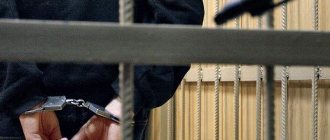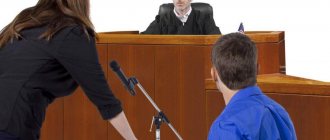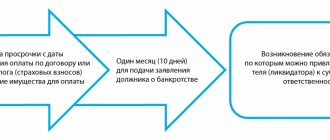ST 88 of the Criminal Code of the Russian Federation.
1. The types of punishments imposed on minors are: a) fine; b) deprivation of the right to engage in certain activities; c) compulsory work; d) correctional labor; e) restriction of freedom; f) imprisonment for a certain period.
2. A fine is imposed both if the convicted minor has independent income or property that can be levied against, or if there is none. A fine imposed on a convicted minor may, by a court decision, be collected from his parents or other legal representatives with their consent. A fine is imposed in the amount of one thousand to fifty thousand rubles or in the amount of wages or other income of a convicted minor for a period of two weeks to six months.
3. Compulsory work is assigned for a period of from forty to one hundred and sixty hours, consists of performing work that is feasible for a minor, and is performed by him in his free time from study or main work. The duration of execution of this type of punishment by persons under the age of fifteen years cannot exceed two hours a day, and by persons aged from fifteen to sixteen years - three hours a day.
4. Correctional labor is assigned to convicted minors for a period of up to one year.
5. Restriction of freedom is imposed on convicted minors as the main punishment for a period of two months to two years.
6. Punishment in the form of imprisonment is imposed on convicted minors who committed crimes before the age of sixteen for a period of not more than six years. For the same category of minors who have committed particularly serious crimes, as well as for other convicted minors, punishment is imposed for a term of not more than ten years and is served in educational colonies. Punishment in the form of imprisonment cannot be imposed on a convicted minor who committed a crime of minor or medium gravity for the first time at the age of sixteen, as well as other juvenile convicts who committed crimes of minor gravity for the first time.
6.1. When a convicted minor is sentenced to imprisonment for committing a grave or especially grave crime, the lower limit of punishment provided for by the relevant article of the Special Part of this Code is reduced by half.
6.2. If a juvenile convict who has been given a conditional sentence has committed a new crime during the probationary period that is not particularly serious, the court, taking into account the circumstances of the case and the identity of the perpetrator, may re-decide on a conditional sentence, establishing a new probationary period and assigning fulfillment of certain duties provided for in part five of Article 73 of this Code.
7. The court may give instructions to the body executing the punishment to take into account certain characteristics of his personality when treating a convicted minor.
The concept of a minor in criminal law
In accordance with the general rules, only a sane individual who has reached the age established by the Criminal Code of the Russian Federation (Article 19 of the Criminal Code of the Russian Federation) can be subject to criminal liability, that is, by the time the crime is committed, the person must have reached the age of sixteen (Part 1 of Article 20 of the Criminal Code of the Russian Federation).
In connection with some features of the physical and mental development of the individual, problems of socialization and awareness of the place and role in society, the categorization of crimes and the statistical prevalence of certain acts among minors, the legislator provided for lowering the age of criminal responsibility of minors to fourteen years for committing a number of crimes provided for in the Special Part of the Criminal Code of the Russian Federation, the list of which is strictly limited in Part 2 of Art. 20 of the Criminal Code of the Russian Federation, these include: “Murder” (Article 105); “Intentional infliction of grievous bodily harm” (Article 111), “Intentional infliction of moderate harm to health” (Article 112), “Kidnapping” (Article 126), “Rape” (Article 131) and others.
Minors are special subjects of criminal relations, as evidenced by the presence of Ch. 14 of the Criminal Code of the Russian Federation, which regulates norms devoted to the peculiarities of criminal liability and punishment of minors (Articles 87–96); recognition of the perpetrator's minority as a circumstance mitigating punishment (clause “b”, part 1, article 61).
From the point of view of criminal law, minors are persons who at the time of committing a crime were fourteen years old, but not eighteen years old (Part 1 of Article 87 of the Criminal Code of the Russian Federation).
Minors, that is, persons who have not reached the age of fourteen at the time the crime was committed, are not subject to criminal liability.
Establishing the age of a minor is mandatory, since it is one of the conditions for criminal liability. A person is considered to have reached the age at which criminal liability begins, not on his birthday, but after its expiration, i.e. from zero o'clock the next day. If it is necessary to establish the age of a minor, an examination is carried out, according to which his birthday is considered the last day of the year determined by the experts, and when establishing the age calculated in the number of years, the court should proceed from the minimum age of such a person proposed by the experts.
If it is established that a minor, during the commission of a socially dangerous act, due to mental retardation not associated with a mental disorder, could not fully understand the actual nature and social danger of his actions (inaction) or direct them, then he is not subject to criminal charges. liability (Part 3 of Article 20 of the Criminal Code of the Russian Federation).
If there is data indicating a delay in the mental development of a minor who has reached the age of criminal responsibility specified in Part 1 or Part 2 of Art. 20 of the Criminal Code of the Russian Federation, in accordance with Art. Art. 195, 196 and part 2 of Art. 421 of the Code of Criminal Procedure of the Russian Federation, a comprehensive psychological and psychiatric examination is appointed in order to resolve the issue of his mental state and ability to correctly perceive circumstances relevant to the criminal case. At the same time, experts should be asked about the influence of the mental state of a minor on his intellectual development, taking into account his age.
The mental disorder of a minor, which does not preclude sanity, is taken into account by the court when assigning punishment as a mitigating circumstance and can serve as a basis for imposing compulsory medical measures (Part 2 of Article 22 of the Criminal Procedure Code of the Russian Federation, Part 2 of Article 433 of the Criminal Procedure Code of the Russian Federation).
When a person reaches the age of eighteen, he loses the special legal status of a minor, and general rules of criminal liability and punishment begin to apply to him in accordance with the Criminal Code of the Russian Federation. When a person commits several crimes, some of which were committed before the age of 18, and others upon reaching 18 years of age, the court must take into account that for crimes committed as a minor, punishment must be imposed taking into account the provisions established by Article 88 of the Criminal Code RF, and for crimes committed at an adult age - within the sanctions of the articles of the Special Part of the Criminal Code of the Russian Federation established for the relevant crimes. In this case, when assigning the final punishment, the rules for assigning punishment for a set of crimes (Article 69 of the Criminal Code of the Russian Federation) are applied without taking into account the provisions of Art. 88 of the Criminal Code of the Russian Federation.
However, according to Art. 96 of the Criminal Code of the Russian Federation, Chapter 14, including the imposition of punishment, in exceptional cases can be applied to persons who have committed a crime at the age of 18 to 20 years, except for placing them in a special closed educational institution or in an educational colony. Such a decision must be motivated in the sentence by the presence of exceptional circumstances characterizing the act committed by the person and his personality.
General characteristics of criminal liability and punishment of minors
Features of criminal liability and punishment of minors are reflected in the following provisions of the Criminal Code of the Russian Federation:
1) the legislator has limited the types of punishment that can be applied to minors, these include: a fine, deprivation of the right to engage in certain activities, compulsory labor, correctional labor, restriction of freedom, imprisonment for a certain period (Article 88 of the Criminal Code of the Russian Federation). Thus, according to the principle of justice, as well as due to age, inability to perform military service, hold certain positions and other circumstances, such types of punishments as: deprivation of the right to hold certain positions cannot be applied to minors; deprivation of a special, military or honorary title, class rank and state awards, restrictions on military service, forced labor, arrest, detention in a disciplinary military unit, life imprisonment, death penalty (Article 44 of the Criminal Code of the Russian Federation);
2) when assigning punishment, the specifics of the subject and the circumstances that contributed to the commission of the crime must be taken into account. So, along with the general principles of sentencing provided for in Art. 60 of the Criminal Code of the Russian Federation, the living conditions and upbringing of a minor, the level of his mental development, other personality characteristics, as well as the influence of older persons on him must be taken into account (Article 89 of the Criminal Code of the Russian Federation);
3) the legislator has determined a special procedure for the grounds for exemption from criminal liability. As an alternative solution, it is possible to apply compulsory educational measures to minors, such as a warning, transfer to the supervision of parents or persons replacing them, or a specialized government body; imposing an obligation to make amends for the harm caused; restriction of leisure and establishment of special requirements for the behavior of a minor (Article 90 of the Criminal Code of the Russian Federation). The use of these measures, and several at the same time, is possible in relation to a minor who has committed a crime of minor or moderate gravity. Thus, the legislator makes it possible to exempt minors from criminal liability by applying compulsory educational measures to them, provided for in Part 2 of Art. 90 of the Criminal Code of the Russian Federation;
4) a minor may be released from punishment with the use of educational measures: when committing crimes of minor and medium gravity - the above listed in Part 2 of Art. 90 of the Criminal Code of the Russian Federation; and also if a minor is sentenced to imprisonment for a crime classified as moderate or serious, then as a compulsory measure of educational influence he can be placed in a special closed educational institution;
5) the legislator has expanded the possibility of conditionally early release of a minor from punishment. Compared to the general conditions provided for in Art. 79 of the Criminal Code of the Russian Federation, the terms of actual serving of the sentence imposed by the court in the form of imprisonment are presented in a truncated form: at least 1/3 of the sentence for a crime of minor, moderate or serious crime; at least 2/3 – for a particularly serious crime (Article 93 of the Criminal Code of the Russian Federation);
6) in addition, when imposing a punishment on a minor using the provisions of Art. 73 of the Criminal Code of the Russian Federation, courts must discuss the issue of imposing specific duties provided for by law on a conditionally convicted person. In addition to the duties that may be assigned to a convicted minor in the manner provided for in Part 5 of Art. 73 of the Criminal Code of the Russian Federation, the court has the right to oblige a convicted minor to undergo a course of social and pedagogical rehabilitation (psychological and pedagogical correction) in institutions that provide pedagogical and psychological assistance to citizens (students, pupils, children) with developmental disabilities. Imposing on a minor the obligation to return to an educational organization to continue studying is possible only if there is a positive conclusion on this from the psychological, medical and pedagogical commission of the education management body;
7) in accordance with Part 4 of Art. 18 of the Criminal Code of the Russian Federation, convictions for crimes committed by a person under the age of 18 are not taken into account in case of recidivism, including in cases where the conviction has not been expunged or expunged. Also, criminal records expunged or expunged in the manner prescribed by Article 95 of the Criminal Code of the Russian Federation are not taken into account;
 according to Art. 95 of the Criminal Code of the Russian Federation, when minors are released from criminal liability or from serving a sentence, the statute of limitations is reduced by half.
according to Art. 95 of the Criminal Code of the Russian Federation, when minors are released from criminal liability or from serving a sentence, the statute of limitations is reduced by half.
A minor is released from criminal liability if the following periods have expired from the date of commission of the crime: one year after the commission of a crime of minor gravity; three years after committing a crime of average gravity; five years after committing a serious crime; seven years six months after the commission of a particularly serious crime.
A minor convicted of committing a crime is released from serving a sentence if the court's conviction was not carried out within the following periods from the date it entered into legal force: one year after the commission of a minor crime; three years after committing a crime of average gravity; five years after committing a serious crime; seven years six months after committing a particularly serious crime;
9) in Art. 95 of the Criminal Code of the Russian Federation, the legislator provided for persons under eighteen years of age a reduction in the terms of expungement of a criminal record, which are respectively equal to: six months after serving or executing a sentence more lenient than imprisonment; one year after serving a sentence of imprisonment for a crime of minor or medium gravity; three years after serving imprisonment for a serious or especially serious crime.
Another comment on Art. 88 of the Criminal Code of the Russian Federation
1. The article under comment provides for the so-called truncated system of punishment, since from a comparison of Art. 44 of the Criminal Code of the Russian Federation with Art. 88 of the Criminal Code of the Russian Federation states that certain types of punishment cannot be imposed on minors.
2. All types of punishments applied to minors, in addition to deprivation of the right to engage in certain activities, have features relating to the size, duration, procedure for execution, type of correctional institution (Part 2 - 6.1 of Article 88 of the Criminal Code of the Russian Federation); these features are revealed in the Resolution of the Plenum of the Supreme Court of the Russian Federation dated February 1, 2011 No. 1.
3. The basis for revoking a suspended sentence is the commission of a particularly serious crime by a minor during the probationary period. If a minor commits a crime of medium gravity or grave during the specified period, the court, taking into account the circumstances of the case and the identity of the perpetrator, may re-decide on a suspended sentence, establishing a new probationary period and imposing on the suspended sentenced person the performance of certain duties provided for in Part 5 of Art. 73 of the Criminal Code of the Russian Federation. If the court finds it possible not to cancel the suspended sentence, then each of the sentences is executed independently.
4. The court may give the body executing the punishment an instruction to take into account, when dealing with a convicted minor, certain characteristics of his personality (level of intellectual and physical development, tendency to drink alcohol, drugs, character traits, interests, habits, state of health, degree of manifestation age-related mental characteristics, etc.).
Features of punishment of minors
The specific features of juvenile delinquency necessitate careful regulation of criminal liability, taking into account the characteristics of their personality. This is expressed in the specifics of establishing the types, terms and amounts of punishment applied to minors, its appointment, exemption from criminal liability and punishment, calculation of statutes of limitations and expungement of criminal records.
Types of punishments imposed on minors (Article 88 of the Criminal Code of the Russian Federation): 1) fine; 2) deprivation of the right to engage in certain activities; 3) compulsory work; 4) correctional work; 5) restriction of freedom; 6) imprisonment for a certain period.
A fine (Part 2 of Article 88 of the Criminal Code of the Russian Federation) is imposed both if the convicted minor has independent income or property that can be levied on, or if there is none. A fine imposed on a convicted minor may, by a court decision, be collected from his parents or other legal representatives with their consent. A fine for minors is imposed in the amount of one thousand to fifty thousand rubles or in the amount of wages or other income of the convicted minor for a period of two weeks to six months.
Deprivation of the right to engage in certain activities. The legislator modified the punishment provided for in Art. 47 of the Criminal Code of the Russian Federation, applying to minors only a ban on engaging in certain activities. This is due to the fact that the age of a minor does not allow him to hold positions in the civil service or local government. When assigning the punishment in question, the court must take into account the fact of the relationship between the crime committed and the engagement in a certain activity. When assigning punishment, it is necessary to be guided by the general norm provided for in Art. 47 of the Criminal Code of the Russian Federation.
Compulsory work (Part 3 of Article 88 of the Criminal Code of the Russian Federation) is assigned for a period of 40 to 160 hours, consists of performing work that is feasible for a minor, and is performed by him in his free time from study or main work. The duration of execution of this type of punishment by persons under the age of 15 years cannot exceed two hours a day, by persons aged 15 to 16 years – three hours a day. When applying this punishment, the court must take into account that free time does not include the time needed by minors for self-study, homework, additional training (music schools, language courses, sports clubs, etc.).
When a court imposes a sentence of correctional labor on a minor, it must keep in mind that this type of punishment can only be applied to that category of juvenile convicts whose correction is possible through socially useful labor without isolation from society.
Imposition of punishment in the form of correctional labor in accordance with Part 4 of Art. 88 of the Criminal Code of the Russian Federation is also possible in relation to a minor undergoing training in general education organizations, organizations of primary vocational, secondary vocational, higher vocational education, except in cases where its implementation may actually impede the continuation of education, for example, in full-time education. Correctional labor can be assigned for a period of up to one year to a minor who has reached the age of 14 years (Article 63 of the Labor Code of the Russian Federation).
When assigning a sentence to a minor in the form of correctional labor, the court must discuss the possibility of his correction without actually serving this sentence.
Punishment in the form of restriction of freedom (Part 5 of Article 88 of the Criminal Code of the Russian Federation) is imposed on minors only as the main punishment, the term is from two months to two years. The legislator does not specify what this type of punishment should be expressed in relation to minors; in this case, it is necessary to be guided by Art. 53 of the Criminal Code of the Russian Federation.
Persons sentenced to punishment in the form of correctional labor and compulsory labor are subject to the norms of the Labor Code of the Russian Federation on the specifics of regulating the labor of workers under the age of 18.
Provisions of Part 3 of Art. 49, part 4 art. 50 and part 5 art. 53 of the Criminal Code of the Russian Federation on the replacement of punishment in the form of compulsory labor, correctional labor, restriction of freedom in case of malicious evasion from serving them with a sentence of imprisonment should be applied to juvenile convicts, taking into account their personality, as well as the reasons for malicious evasion from serving the sentence if they are recognized as impossible corrections without isolation from society and with the reasons for the decision made. Moreover, the provisions of these norms are not applicable to those categories of juvenile convicts who, in accordance with Part 6 of Article 88 of the Criminal Code of the Russian Federation, cannot be sentenced to imprisonment.
Imprisonment is imposed on convicted minors who committed a crime before the age of sixteen for a term of not more than six years. For the same category of minors who have committed particularly serious crimes, as well as for other convicted minors, punishment is imposed for a term of not more than ten years and is served in educational colonies. Punishment in the form of imprisonment cannot be imposed on a convicted minor who committed a crime of minor or moderate gravity for the first time at the age of sixteen years, as well as other juvenile convicts who committed crimes of minor gravity for the first time.
In accordance with Part 61, Art. 88 of the Criminal Code of the Russian Federation, for a minor convicted of committing a grave or especially grave crime, the lower limit of punishment in the form of imprisonment, provided for by the corresponding article of the Special Part of the Criminal Code of the Russian Federation, is reduced by half.
Judicial practice under Article 88 of the Criminal Code of the Russian Federation
Resolution of the Presidium of the Supreme Court of the Russian Federation dated March 15, 2017 N 4-P17
By the cassation ruling of the judicial panel for criminal cases of the Stavropol Regional Court dated December 17, 2008, the verdict was changed: the conviction of O.I. Dymov was excluded. according to Part 5 of Art. Criminal Code of the Russian Federation and Art. of the Criminal Code of the Russian Federation, Part 6.1 of Art. of the Criminal Code of the Russian Federation and under Part 3 of Art. , paragraph “b”, part 2, art. 228.1 of the Criminal Code of the Russian Federation sentenced to imprisonment for a period of 2 years 6 months; on the basis of Part 5 of Art. The Criminal Code of the Russian Federation, in combination with the sentence of April 24, 2008, imposed 5 years and 10 months of imprisonment in a general regime correctional colony.
Appeal ruling of the Judicial Collegium for Criminal Cases of the Supreme Court of the Russian Federation dated 06/07/2018 N 43-APU18-3
- April 12, 2007 under Part 2 of Art. 162 of the Criminal Code of the Russian Federation, with approx. Part 6.1 Art. , part 5 art. , Art. of the Criminal Code of the Russian Federation to 3 years 5 months of imprisonment, released on parole for 1 year 5 months 16 days, on the basis of a court ruling dated May 18, 2009 in accordance with Part 7 of Art. The Criminal Code of the Russian Federation abolished parole;
Appeal ruling of the Judicial Collegium for Military Personnel Cases of the Supreme Court of the Russian Federation dated September 25, 2018 N 203-APU18-18
Having made this conclusion, the court, when imposing punishment on Liu, was obliged to be guided by Part 1 of Art. and part 2 of Art. The Criminal Code of the Russian Federation taking into account Part 6 of Art. The Criminal Code of the Russian Federation, according to which minors aged sixteen to eighteen years, as well as those who have committed especially serious crimes, are sentenced to a term of not more than ten years.
Appeal ruling of the Judicial Collegium for Criminal Cases of the Supreme Court of the Russian Federation dated November 7, 2018 N 71-APU18-4
— 02.22.2017 under clause “d”, part 2 of art. 162, paragraph “b”, part 2, art. 158, paragraphs “a”, “b”, part 2 of Art. 158, paragraphs “a”, “b”, part 2 of Art. 158, paragraphs “a”, “b”, “c”, part 2 of Art. 158, paragraph “a”, part 3, art. 158, part 1 art. 161, paragraphs “a”, “b”, “c”, part 2 of Art. 158, paragraphs “a”, “b”, part 2 of Art. 158, paragraphs “a”, “b”, “c”, part 2 of Art. 158, paragraphs “a”, “b”, part 2 of Art. 158, paragraphs “b”, “c”, part 2 of Art. 158, paragraph “a”, part 2, art. 158, paragraph “a”, part 2, art. 158, paragraphs “a”, “b”, part 2 of Art. 158, paragraphs “a”, “b”, part 2 of Art. 158, paragraphs “a”, “b”, “c”, part 2 of Art. 158, art. , Part 3, 69, 73 of the Criminal Code of the Russian Federation to 4 years 3 months of suspended imprisonment, with a probationary period of 4 years, -
Cassation ruling of the Judicial Collegium for Criminal Cases of the Supreme Court of the Russian Federation dated February 21, 2019 N 3-O19-1
- March 5, 2007 under Part 3 of Art. , paragraph “b”, part 2, art. 158, part 6.2 art. of the Criminal Code of the Russian Federation to suspended imprisonment for 1 year with a probationary period of 1 year, - March 14, 2007 (taking into account the decisions of June 2, 2011 and November 25, 2021) under clauses “a”, “b”, part. 2 tbsp. 158, part 5 art. of the Criminal Code of the Russian Federation to imprisonment for 1 year 5 months,
Appeal ruling of the Judicial Collegium for Criminal Cases of the Supreme Court of the Russian Federation dated 06.06.2019 N 66-APU19-7
Convicted under paragraph “g” of Part 2 of Art. 105 of the Criminal Code of the Russian Federation, taking into account Part 6.1 of Art. of the Criminal Code of the Russian Federation to 4 years 6 months of imprisonment in a correctional colony. Preventive measure for Chumakova R.R. changed from recognizance not to leave and proper behavior to detention until the sentence enters into legal force.
Appeal ruling of the Judicial Collegium for Criminal Cases of the Supreme Court of the Russian Federation dated July 23, 2019 N 44-APU19-9
August 26, 2013 under Part 2 of Art. 162 of the Criminal Code of the Russian Federation using Part 6.1 of Art. of the Criminal Code of the Russian Federation to 2 years 9 months of imprisonment, on the basis of Art. of the Criminal Code of the Russian Federation for a total of sentences to 3 years and 6 months of imprisonment, released on November 15, 2021 after serving the sentence; by a judge's ruling dated September 18, 2021 (taking into account the appeal ruling of the Perm Regional Court dated October 18, 2021) to bring the sentences into compliance with the current legislation of K.M. Mukhamedov. by a court verdict dated August 26, 2013 on the basis of paragraph “b” of Part 3.1 of Art. The Criminal Code of the Russian Federation is counted towards the sentence at the rate of one day of detention for one and a half days of serving the sentence in a correctional colony; the time of detention from May 16, 2013 to the day the sentence entered into legal force on November 7, 2013;
Appeal ruling of the Judicial Collegium for Criminal Cases of the Supreme Court of the Russian Federation dated August 15, 2019 N 9-APU19-16
Since the aggravating circumstances provided for in Art. of the Criminal Code of the Russian Federation, the court did not establish that the punishment was imposed on the convicted using the provisions of Part 1 of Art. of the Criminal Code of the Russian Federation, and to the minor V.S. Sharkov, in addition, in accordance with the rules of Part 6 of Art. Criminal Code of the Russian Federation.
Appeal ruling of the Judicial Collegium for Criminal Cases of the Supreme Court of the Russian Federation dated August 28, 2019 N 72-APU19-9
1. April 21, 2015 under clauses “a”, “b”, part 2 of art. 158, part 3 art. clause "a" part 2 art. 166, part 3 art. clause "a" part 2 art. 166, paragraph “a”, part 3, art. 158, paragraph “c”, part 3, art. 158, paragraphs “a”, “b”, part 2 of Art. 158, part 3 art. of the Criminal Code of the Russian Federation to 2 years 9 months of imprisonment to be served in a correctional colony;
Appeal ruling of the Judicial Collegium for Criminal Cases of the Supreme Court of the Russian Federation dated September 19, 2019 No. 16-APU19-12
Punishment for the convicted Borzov A.N. and Dorofeev D.A. appointed in accordance with the requirements of Art. Art. , Criminal Code of the Russian Federation, and Dorofeev D.A. also in accordance with Part 6, 6.1 Art. of the Criminal Code of the Russian Federation, data on the identity of the perpetrators, taking into account mitigating circumstances: Borzov A.N. - surrender, partial confession of guilt at the initial stage of the preliminary investigation during interrogation as a suspect, young, from Dorofeev D.A. - minority.
Appeal ruling of the Judicial Collegium for Criminal Cases of the Supreme Court of the Russian Federation dated September 24, 2019 N 12-APU19-1
convicted using Part 6, 6.1 Art. of the Criminal Code of the Russian Federation under paragraph “c” of Part 4 of Art. 162 of the Criminal Code of the Russian Federation to 6 years in prison, under paragraphs “g”, “z”, part 2 of Art. 105 of the Criminal Code of the Russian Federation to 8 years in prison. Based on Part 3 of Art. According to the Criminal Code of the Russian Federation, for the totality of these crimes, by partial addition of punishments, he was finally sentenced to 9 years of imprisonment to be served in a correctional colony.





